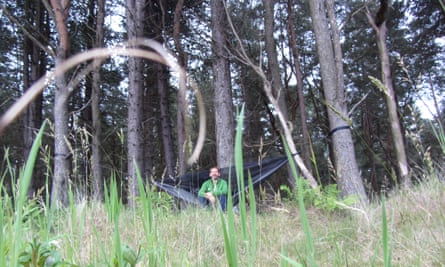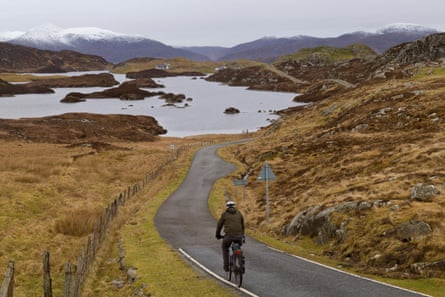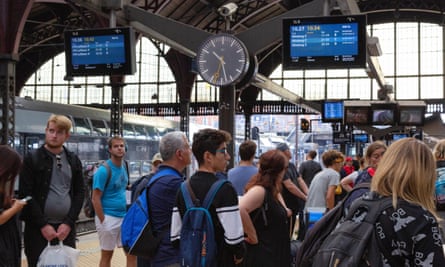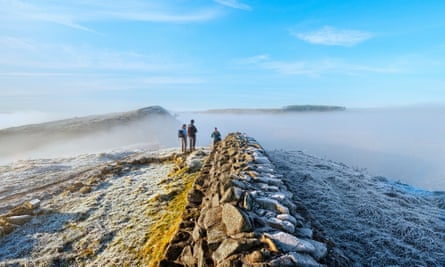
In the depths of winter, in the midst of a cost of living crisis, I bring glad tidings. That ultra-shoestring-budget holiday you’re resigning yourself to this year? Add a splash of creativity and it’ll turn out way better than you think.
As an author who has spent most of his adult life starving in a garret, I’ve nearly always had to opt for cheap and cheerful holidays. And my experience is that they’re not merely on a par with those that come with rather more trimmings, they’re very often much more enjoyable and satisfying. Let me explain.
For a start, some of the best memories are made from meeting local people and experiencing kindness, whether at home or abroad. Luxury, on the other hand, tends to insulate you from such encounters. For example, inspired by Shakespeare’s many journeys on foot between Stratford-upon-Avon and London, I decided to celebrate finishing a book (writing one, not just reading one) by taking a walking holiday from my east London flat to my sister’s home near the Suffolk/Norfolk border. I threw a few things in a rucksack, headed out along the River Lea, and arrived at a rural campsite by late evening. This was when disaster struck – I found it unexpectedly shut. There were no other campsites for miles and nowhere practical to wild camp. Ten minutes later, I was in a pub explaining my predicament to the landlady as she poured me a pint. My tale was overheard and I was immediately offered a free bed by a local family. I was even given breakfast and a lift back to the pub the next morning to continue my walk. Thanks, Bill.
Camping is, of course, the obvious choice for a budget traveller. My investment in a bit of camping gear (there are plenty of low-priced options out there nowadays) has repaid itself many times over, on cycling and hiking trips. Facilities at campsites have improved immeasurably since the British camping boom began in the early 2000s. And although there has also been a commensurate increase in prices, there are still plenty of perfectly good sites with everything you need for under a tenner a night.
Naturally, the cheapest camping of all is wild camping, which is entirely legal in parts of Dartmoor (for now) and throughout Scotland (with commonsense caveats) – though I admit it’s not for everyone. I ensure I pitch late, strike camp early and leave no trace – and I’ve never once had a problem. Furthermore, wild camping has allowed me to stay in some delightful out-of-the-way places – up mountains, on cliff-tops, and by lakes and lochs – and given me many special moments of connection with wildlife. I’ve gone to sleep with badgers roaming about me; woken up to muntjac deer at my tent flap; and even had a sneaky hedgehog (when did you last see one of those?) paying a visit to help itself to my snacks.
But if that’s a little too out there for you, or you don’t have a tent, how about a bothy or camping barn? Basic but sound shelters, often with a fireplace, they offer somewhere to lay a sleeping bag down and perhaps swap candlelit stories with other wanderers. Joining Scotland’s Mountain Bothies Association gives you free access to about 100 shelters, many in stunning locations.

Hostels and bunkhouses provide another step up in comfort while remaining economical. I have passed many a cosy evening in hostels run by the YHA and in independent ones. I once spent a very memorable week cycling the length of the Western Isles, staying in bunkhouses converted from traditional blackhouses. The camaraderie among my fellow hostellers was infectious. And one night, after a very wet day in the saddle, two young women took pity on the “poor wee bedraggled thing” I had become and cooked me dinner.
A general lack of funds hasn’t stopped me from crossing the Channel either. The Interrail pass is one of Europe’s crowning glories and was created expressly to offer hard-up youth an affordable way of seeing the continent. On my first Interrail odyssey, 30-odd years ago, I saved even more money by eschewing conventional accommodation and taking a sleeper train every night to my next destination. Unable to afford a cabin, I became expert at getting the maximum comfort from carriage seats. And on those occasions when sleep was hard to come by, it was thrilling to watch the dawn break as I rattled into each new country. I saw nine nations in a fortnight and became uncurably infected with the travel bug. (Many of the sleeper trains I took no longer exist but, happily, new sleeper services are opening up across Europe again.) I repeated the experience in 2019 on a journey that took in Athens, Budapest, Venice and more.

Now available to travellers of all ages, Interrail passes covering 33 countries start at £212 (£159 for under-28s). Cheaper single-country passes are great for those wanting to explore just one nation. And whatever pass you buy, children under 12 go absolutely free, which is the very best sort of cheap.
There are bargains to be had even on Britain’s overpriced railways – when they are not strikebound. Rover tickets offer some of the best value for money – there are currently more than 80, covering most regions from Cornwall to the Highlands. Using the North Country Rover, I had a highly enjoyable budget trip that took in the Lake District, Hadrian’s Wall and the North Yorkshire coast. At Scarborough, I hunted down the cheapest B&B in town and not only was it clean and cheery, the room even had a four-poster bed.
Bus rovers are similarly the budget traveller’s friend – most major and some minor bus companies offer them. I once spent 45 days on a low-cost trip around the entire mainland coast of Britain using only local buses (and a tent) but I’m sure shorter trips could also be fun.

You may be wondering at this point why I haven’t mentioned cheap flights. Well, without wanting to climb into a pulpit, it’s because they’re a bit of a misnomer: they may cost very little now but the damage they do means that you (and everyone else) will continue picking up the bill for them well into the future. And besides that, who wants to start and finish their holiday being treated like cattle?
This all goes to the heart of a fundamental question: why travel? If it’s to have a horizon-widening experience that’s also fun and likely to provide you with memories to savour in your rocking chair, I’d venture that a budget holiday is more likely to give you that than its more expensive conventional counterpart. Although money can certainly buy you comfort on your travels, it can’t buy you joy. And having to think creatively about travelling means you’re far more likely to wind up having an adventure. And without bankrupting yourself, which is always a bonus.
Tips on doing more for less
Trains
For rail travel in Britain, use one of the many split-ticketing sites. These burrow into the dark heart of the nation’s rail pricing system to find the cheapest possible fares. I use ticketysplit.co.uk. Buy early: advance rail tickets offer huge savings and go on sale up to three months ahead. They become more expensive as stocks diminish, and can be changed for a fee, but aren’t refundable. For rail rover and ranger tickets, visit railrover.org. Railcards can pay for themselves in one or two journeys. Combined ferry/rail tickets (search for “sail rail Europe”) are usually cheaper than separate fares. Join mailing lists to get news of special offers: this has saved me lots on Eurostar, Interrail and LNER .
Buses
Search for “bus rover ranger ticket” and the region you’re travelling to. For example, West Yorkshire’s MCard or North Wales’s the 1bws ticket give a day’s unlimited bus travel for very little.
Accommodation
Try the Youth Hostel Association, independent hostels the Independent Hostel Guide, the Gatliff Trust , and the Mountain Bothies Association.
Camping
My favourite site is ukcampsite.co.uk, which lists thousands of UK and European sites and has good filters. For £45 a year, the Camping & Caravanning Club gives access to 1,200 (usually very cheap) member-only sites.


